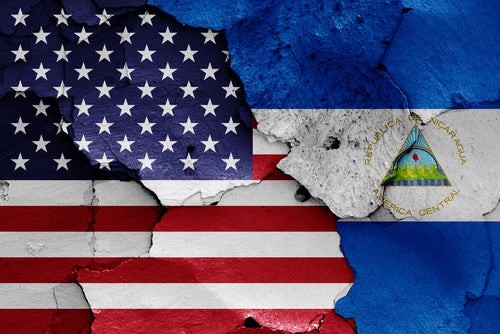
US President Biden’s administration announced yesterday (24 October) that it is taking action to hold Nicaragua’s Ortega-Murillo regime accountable for what it describes as “escalating human rights violations, continued dismantling of democratic institutions, attacks on civil society, and increasing security cooperation with Russia”.
Associate professor of fashion and apparel studies at the University of Delaware, Dr Sheng Lu, tells Just Style exclusively the latest executive order (EO) suggests the Biden administration is ready to take action to block US imports from Nicaragua, given the deteriorating situation within the country.
He warns: “US fashion companies currently sourcing apparel from Nicaragua should watch the situation closely and evaluate the impact of looming trade sanctions.”
Lu explains data shows US fashion companies primarily use Nicaragua as a sourcing base for basic tops (such as T-shirts) and bottoms (such as shorts, trousers, and jeans), so it targets the mass market.
However, he adds: “Nicaragua ranks as US companies’ second largest sourcing base in the CAFTA-DR region so it accounts for about 22-23% of US apparel sourcing from CAFTA-DR, only after Honduras.”
For this reason he suggests restricting imports from Nicaragua would complicate the Biden administration’s efforts to boost apparel sourcing from the CAFTA-DR region as a tool to solve the root causes of migration.

US Tariffs are shifting - will you react or anticipate?
Don’t let policy changes catch you off guard. Stay proactive with real-time data and expert analysis.
By GlobalDataFurther, he says: “Considering the apparel sector’s critical role in Nicaragua’s economy and job creation, the debate about Nicaragua and the right US policy actions would likely continue even after the trade sanction.”
The executive order amends EO 13851 (Blocking Property of Certain Persons Contributing to the Situation in Nicaragua) to expand the authorities available to increase targeted pressure on the Ortega-Murillo regime. This gives the US administration additional means to target the regime while allowing the flexibility necessary to continue to support the people of Nicaragua.
The White House factsheet explains the Biden-Harris Administration is taking the following actions:
- The amended EO substantially expands the US’ Nicaragua sanctions programme with sectoral sanctions authorities, which expose individuals and entities operating in identified sectors to sanctions. Specifically, the amended EO identifies the gold sector of the Nicaraguan economy, which the Ortega-Murillo regime uses to fund its authoritarian and destabilising activities. The EO also allows for the future identification of additional sectors that could become subject to sanctions, if warranted.
- The amended EO adds new authorities to allow for the imposition of future restrictions on certain trade with Nicaragua to limit the outsized financial benefits of certain trade from flowing to the Ortega-Murillo regime, as warranted. This could potentially include restrictions on both imports into the United States from Nicaragua and exports from the United States to Nicaragua.
- The amended EO authorises certain restrictions on new investment in sectors of the Nicaraguan economy to prevent the United States from contributing to the corrupt regime’s coffers.
- Concurrent with this action, the Department of the Treasury is designating a key Nicaraguan entity that is central to the mining sector that directly benefits the Ortega-Murillo regime, as well as an individual linked to major human rights abuses in the country.
- To continue supporting the Nicaraguan people and hold those who support the corrupt Nicaraguan Government accountable, the State Department is imposing visa restrictions on more than 500 Nicaraguan individuals, and their family members, who work for the Nicaraguan Government or formulate, implement, or benefit from policies or actions that undermine or injure democratic institutions or impede the return to democracy in the country.



